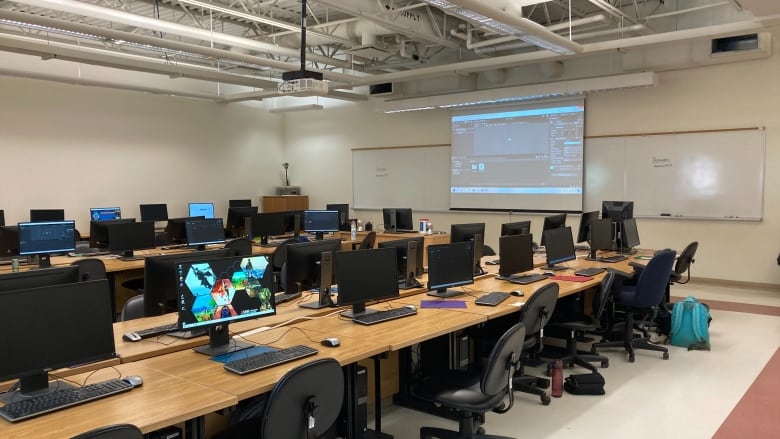UNB's video game camp teaches middle schoolers how to code
Coding camps give kids 'fundamentals' to explore future programming projects

On the car ride to his first day of coding camp, 12-year-old Pranav Shukla waited in excitement as his father, Dhirendra Shukla, pulled into the parking lot of the information technology centre at the University of New Brunswick.
Starting grade eight in the fall, Pranav is a lover of computer games and programming. UNB's summer video game camp is allowing him to dive into and merge both interests, said his father.
"My hope is that he walks away and continues to build on this himself independently and that he receives the skills that he is excited about," said Shukla.
Middle school kids are learning how to build a version of the computer game Pong at a week-long video game coding camp hosted by UNB.
After a hiatus due to the COVID-19 pandemic, the camp is back in-person at the information technology centre at the faculty of computer science.

Learning by doing and watching
This summer, the university is offering three one-week camps for middle and high school students interested in learning video game programming and development.
According to Connor Wilson, a UNB computer science instructor who designed the learning modules, the kids are learning to use a programming language called C Sharp (C#).
During the lesson, Wilson has his screen projected on the whiteboard at the front of the classroom so the students can follow along step by step. There are support staff walking around to assist the classroom of 20 kids if it is needed.
"The kids seem really engaged in it, which I think is really amazing to see them really take to it," said Wilson. "I was joking around with [the kids] a little bit and I said, 'You're all computer programmers' after they did their first program and people cheered, which I laughed at."

During the day, the participants go back and forth between plugged-in and unplugged activities, according to Alex McInnis, a fourth-year computer science student at UNB and the co-instructor for the coding classes.
Plugged-in activities consist of programming and coding to develop the Pong game. Unplugged activities are to come up with the elements needed to create a game. This includes selecting music and learning what constitutes a good character design in a video game.
"It's nice to have a reward. So these kids, at the end of their lesson, they have something they could walk away with, which is the game," said McInnis.
The reward
McInnis is confident the participants are walking away with the "fundamentals'' needed to go home and build on the Pong game if they wish and move onto more complex coding projects.
"I hope that they walk away with, not only their completed project, but a sense of accomplishment, knowing that they did this. They can do it again and make something a little more complex, being able to tackle a project like this," said McInnis.
The program was originally designed for 12 students, but demand from the community increased the number to 20. There are about 40 students on the waiting list for the next session, according to Wilson.
As a parent and an engineer himself, Shukla hopes that this project will encourage his son to continue pursuing his dreams and passions.
"When you think about coding, you think about math, most people get nervous. I want him to be excited. Once you're excited, you can continue to build and grow that momentum," said Shukla.

